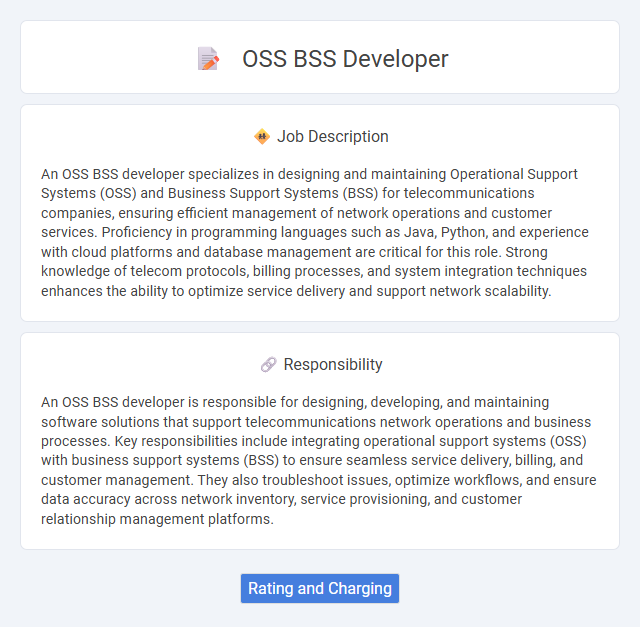
An OSS BSS developer specializes in designing and maintaining Operational Support Systems (OSS) and Business Support Systems (BSS) for telecommunications companies, ensuring efficient management of network operations and customer services. Proficiency in programming languages such as Java, Python, and experience with cloud platforms and database management are critical for this role. Strong knowledge of telecom protocols, billing processes, and system integration techniques enhances the ability to optimize service delivery and support network scalability.
Individuals with strong analytical skills and a keen interest in telecommunications systems will likely find OSS BSS developer roles suitable. Candidates comfortable with complex problem-solving, coding, and system integration may adapt well to the dynamic and detailed nature of OSS BSS development. Those who prefer structured environments and continuous learning might experience higher job satisfaction and success in this field.
Qualification
An OSS BSS developer must possess strong proficiency in programming languages such as Java, Python, or C++, alongside expertise in telecommunications protocols and network architecture. In-depth knowledge of OSS (Operational Support Systems) and BSS (Business Support Systems) platforms, database management, and API integration is essential. Candidates should demonstrate experience with service management, billing systems, and system automation to optimize telecom operations and customer service processes.
Responsibility
An OSS BSS developer is responsible for designing, developing, and maintaining software solutions that support telecommunications network operations and business processes. Key responsibilities include integrating operational support systems (OSS) with business support systems (BSS) to ensure seamless service delivery, billing, and customer management. They also troubleshoot issues, optimize workflows, and ensure data accuracy across network inventory, service provisioning, and customer relationship management platforms.
Benefit
An OSS BSS developer position likely offers competitive salaries and opportunities for professional growth within the telecommunications industry. Access to cutting-edge technology projects and collaborative work environments may enhance skill development and career progression. Employees might enjoy flexible work arrangements, comprehensive benefits, and exposure to global telecom standards, increasing job satisfaction and long-term stability.
Challenge
Working as an OSS BSS developer likely involves navigating complex integration challenges between operational support systems and business support systems, requiring a strong grasp of telecommunications protocols and data management. The role probably demands problem-solving skills to ensure seamless communication between network operations and customer service platforms. It might also require adapting to evolving technologies and regulatory requirements, making it a continuously challenging and dynamic position.
Career Advancement
OSS BSS developers specialize in designing and maintaining operational support systems and business support systems critical for telecommunications providers, offering a deep understanding of network management and customer billing processes. Mastery in programming languages such as Java, Python, and expertise with cloud platforms accelerates career progression to senior developer, solutions architect, or technical lead roles. Continuous skill enhancement in emerging technologies like 5G, NFV, and automation tools significantly boosts opportunities for managerial positions and specialized consultancy within the telecom industry.
Key Terms
Rating and Charging
An OSS BSS developer specializing in Rating and Charging designs robust software solutions to accurately calculate and apply charges for telecom services, ensuring efficient billing processes. Expertise in implementing complex rating algorithms, real-time charging systems, and integration with mediation and billing platforms is crucial for optimizing revenue management. Proficiency in languages like Java or C++ combined with knowledge of telecom protocols such as SMPP and Diameter enhances the ability to develop scalable and reliable charging modules.
 kuljobs.com
kuljobs.com